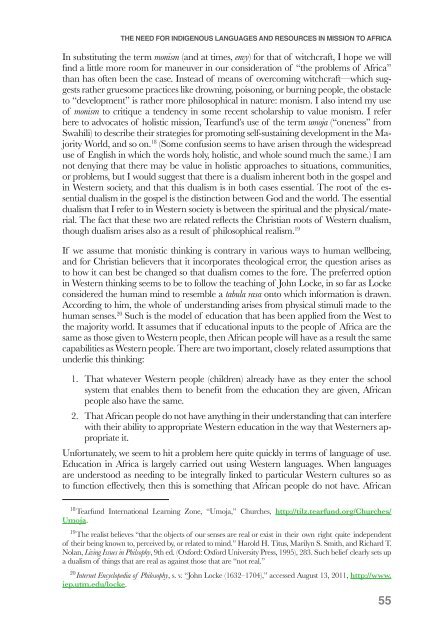VULNERABLE MISSION
VULNERABLE MISSION
VULNERABLE MISSION
You also want an ePaper? Increase the reach of your titles
YUMPU automatically turns print PDFs into web optimized ePapers that Google loves.
THE NEED FOR INDIGENOUS LANGUAGES AND RESOURCES IN <strong>MISSION</strong> TO AFRICA<br />
In substituting the term monism (and at times, envy) for that of witchcraft, I hope we will<br />
find a little more room for maneuver in our consideration of “the problems of Africa”<br />
than has often been the case. Instead of means of overcoming witchcraft—which suggests<br />
rather gruesome practices like drowning, poisoning, or burning people, the obstacle<br />
to “development” is rather more philosophical in nature: monism. I also intend my use<br />
of monism to critique a tendency in some recent scholarship to value monism. I refer<br />
here to advocates of holistic mission, Tearfund’s use of the term umoja (“oneness” from<br />
Swahili) to describe their strategies for promoting self-sustaining development in the Majority<br />
World, and so on. 18 (Some confusion seems to have arisen through the widespread<br />
use of English in which the words holy, holistic, and whole sound much the same.) I am<br />
not denying that there may be value in holistic approaches to situations, communities,<br />
or problems, but I would suggest that there is a dualism inherent both in the gospel and<br />
in Western society, and that this dualism is in both cases essential. The root of the essential<br />
dualism in the gospel is the distinction between God and the world. The essential<br />
dualism that I refer to in Western society is between the spiritual and the physical/material.<br />
The fact that these two are related reflects the Christian roots of Western dualism,<br />
though dualism arises also as a result of philosophical realism. 19<br />
If we assume that monistic thinking is contrary in various ways to human wellbeing,<br />
and for Christian believers that it incorporates theological error, the question arises as<br />
to how it can best be changed so that dualism comes to the fore. The preferred option<br />
in Western thinking seems to be to follow the teaching of John Locke, in so far as Locke<br />
considered the human mind to resemble a tabula rasa onto which information is drawn.<br />
According to him, the whole of understanding arises from physical stimuli made to the<br />
human senses. 20 Such is the model of education that has been applied from the West to<br />
the majority world. It assumes that if educational inputs to the people of Africa are the<br />
same as those given to Western people, then African people will have as a result the same<br />
capabilities as Western people. There are two important, closely related assumptions that<br />
underlie this thinking:<br />
1. That whatever Western people (children) already have as they enter the school<br />
system that enables them to benefit from the education they are given, African<br />
people also have the same.<br />
2. That African people do not have anything in their understanding that can interfere<br />
with their ability to appropriate Western education in the way that Westerners appropriate<br />
it.<br />
Unfortunately, we seem to hit a problem here quite quickly in terms of language of use.<br />
Education in Africa is largely carried out using Western languages. When languages<br />
are understood as needing to be integrally linked to particular Western cultures so as<br />
to function effectively, then this is something that African people do not have. African<br />
18 Tearfund International Learning Zone, “Umoja,” Churches, http://tilz.tearfund.org/Churches/<br />
Umoja.<br />
19 The realist believes “that the objects of our senses are real or exist in their own right quite independent<br />
of their being known to, perceived by, or related to mind.” Harold H. Titus, Marilyn S. Smith, and Richard T.<br />
Nolan, Living Issues in Philsophy, 9th ed. (Oxford: Oxford University Press, 1995), 283. Such belief clearly sets up<br />
a dualism of things that are real as against those that are “not real.”<br />
20 Internet Encyclopedia of Philosophy, s. v. “John Locke (1632–1704),” accessed August 13, 2011, http://www.<br />
iep.utm.edu/locke.<br />
55


